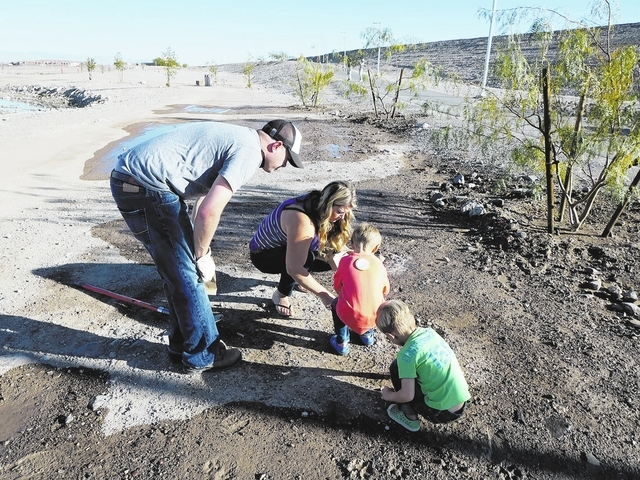Master gardeners make difference at Cornerstone Park
University of Nevada Cooperative Extension Southern Nevada Master Gardeners helped plant shade trees, aquatic shrubs and sow wildflower seeds at Cornerstone Park in Henderson as part of Make a Difference Day Oct. 26.
Make a Difference Day is the largest national day of community service, uniting volunteers around the world on projects that improve their communities.
For the event, master gardeners donated 200 bags filled with wildflower seeds that they had collected. The Master Gardener Seed Bank Project used desert marigold, blanket flower and firecracker penstemon seeds that came from the demonstration and test gardens at Cooperative Extension’s Lifelong Learning Center. The seeds were used to enhance the native look of the park at 1600 Wigwam Parkway. It is a new park with a lot of bare, rocky ground.
“It was such a good feeling to know these seeds would be put to good use,” said Anne Marie Lardeau, a master gardener volunteer and a leader for the seed bank project.
The Cooperative Extension Demonstration Gardens have a similar area where the selected plants grow without assistance. It is an excellent demonstration of how native wildflowers can soften a bare, rocky landscape, she said.
“That exact scenario is what gave me the idea to introduce them to Cornerstone Park in Henderson,” Lardeau said.
About 175 of the 200 seed bags were used by volunteers during the Make a Difference Day event. Master gardeners hope to expand the seed bank project to other parks or disturbed areas.
“Some of these seeds are not available commercially or are very expensive for a tiny quantity,” Lardeau said.
The goal of the seed-sowing project at Cornerstone Park was to grow “mother plants” in areas receiving minimal irrigation. It is hoped those plants will grow larger than normal and produce an abundant crop of seeds to be carried by the wind into wider areas of the park.
Lardeau said the desert marigolds will probably have the biggest impact since they reseed easily and grow in the rockiest landscape without irrigation. The plants bloom almost year-round.
More than 170 community and master gardener volunteers participated in the event. Among the volunteers were plant captains Jodi Starkey, Connie Colvin, Judy Ross,Christy Mulligan, Debra Jacobson, Leta Rehn and Lardeau, who answered questioned and provided instructions for planting the trees and seeds correctly.
“I say this every year, if not for the master gardeners, we could not do these plantings. It’s with their expertise they teach the community, by doing and showing them in a loving, caring leadership style,” said Lisa Ortega, urban forester for Henderson.
Those interested in the Master Gardener Seed Bank Project or in touring the Demonstration and Test Gardens may contact Ann Edmunds, master gardener program officer, at 702-257-5587 or edmundsa@unce.unr.edu for more information.


















